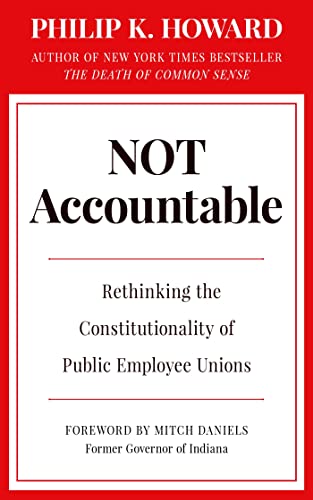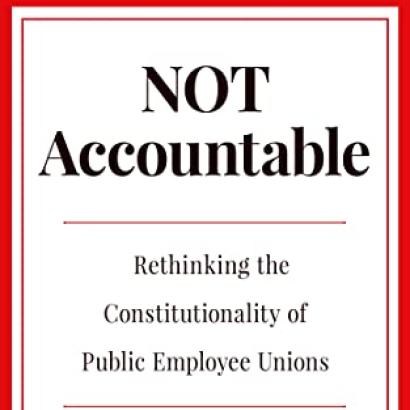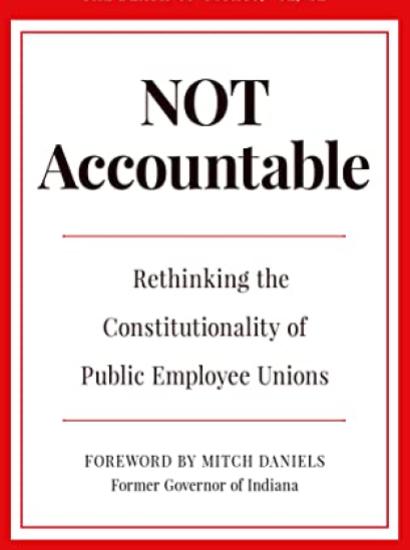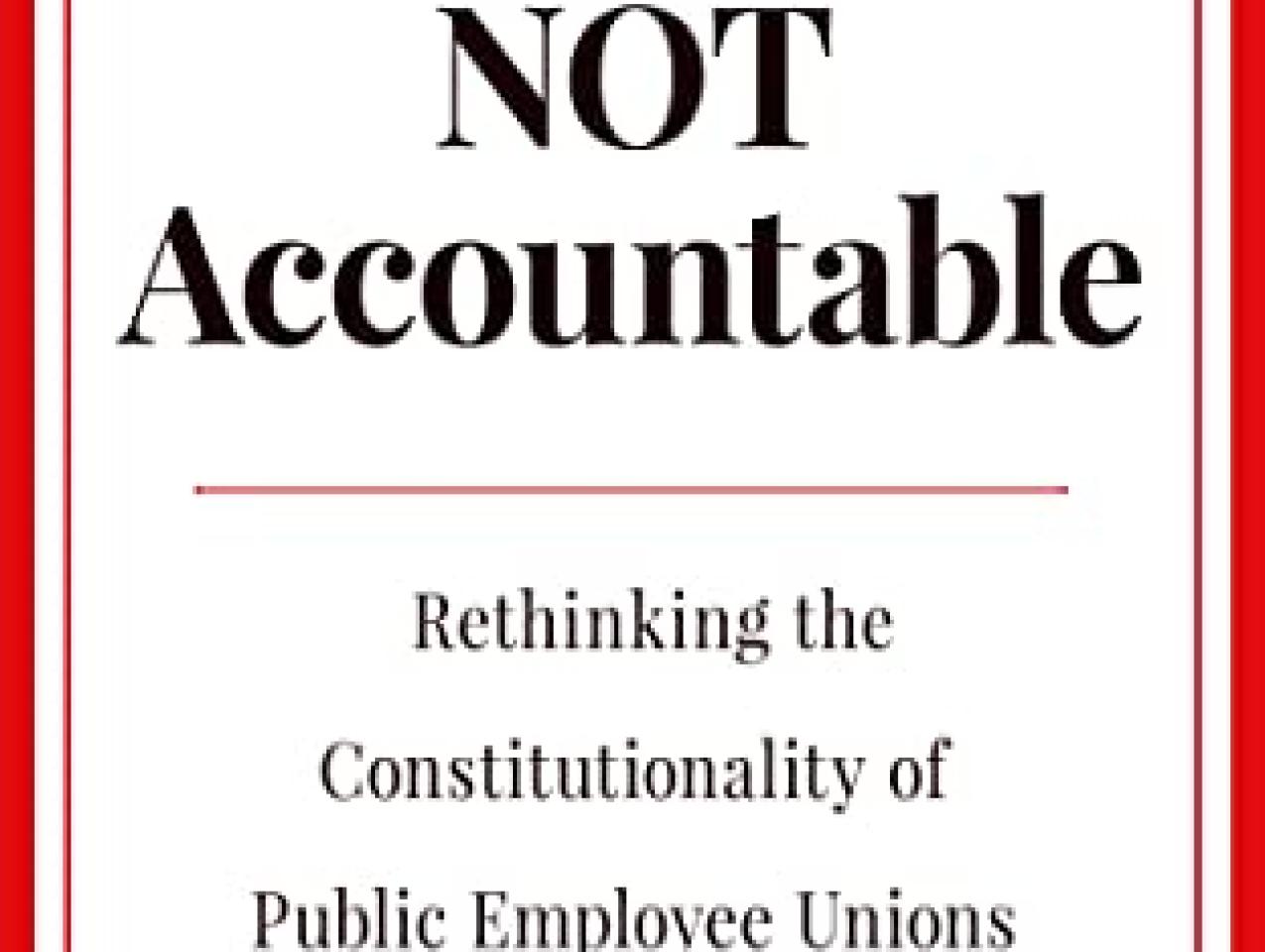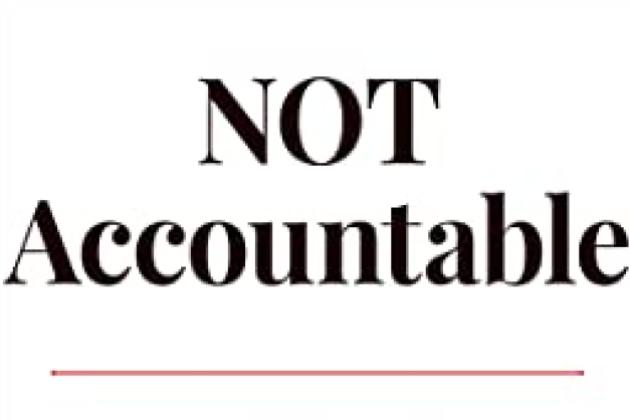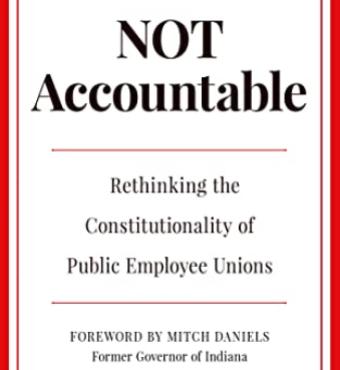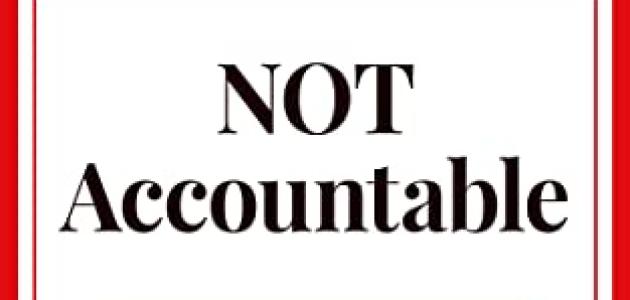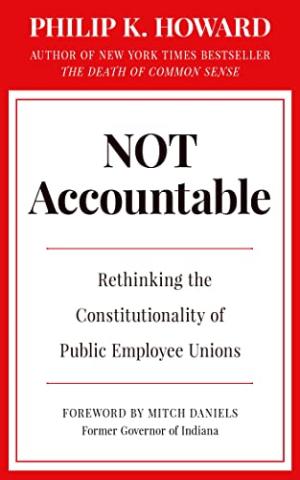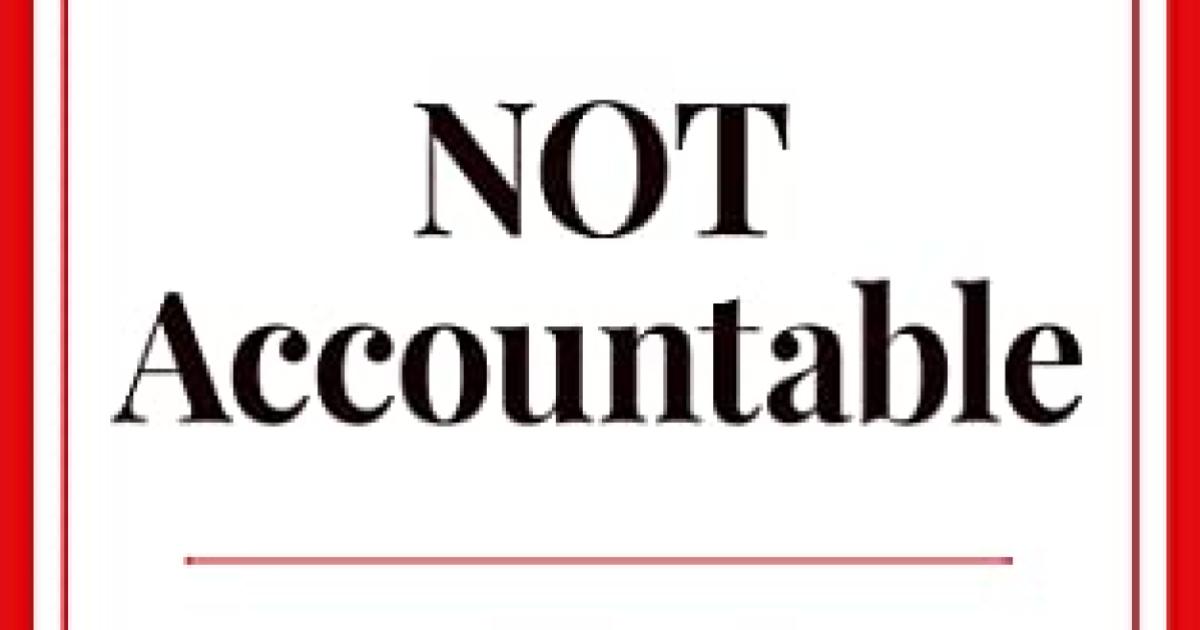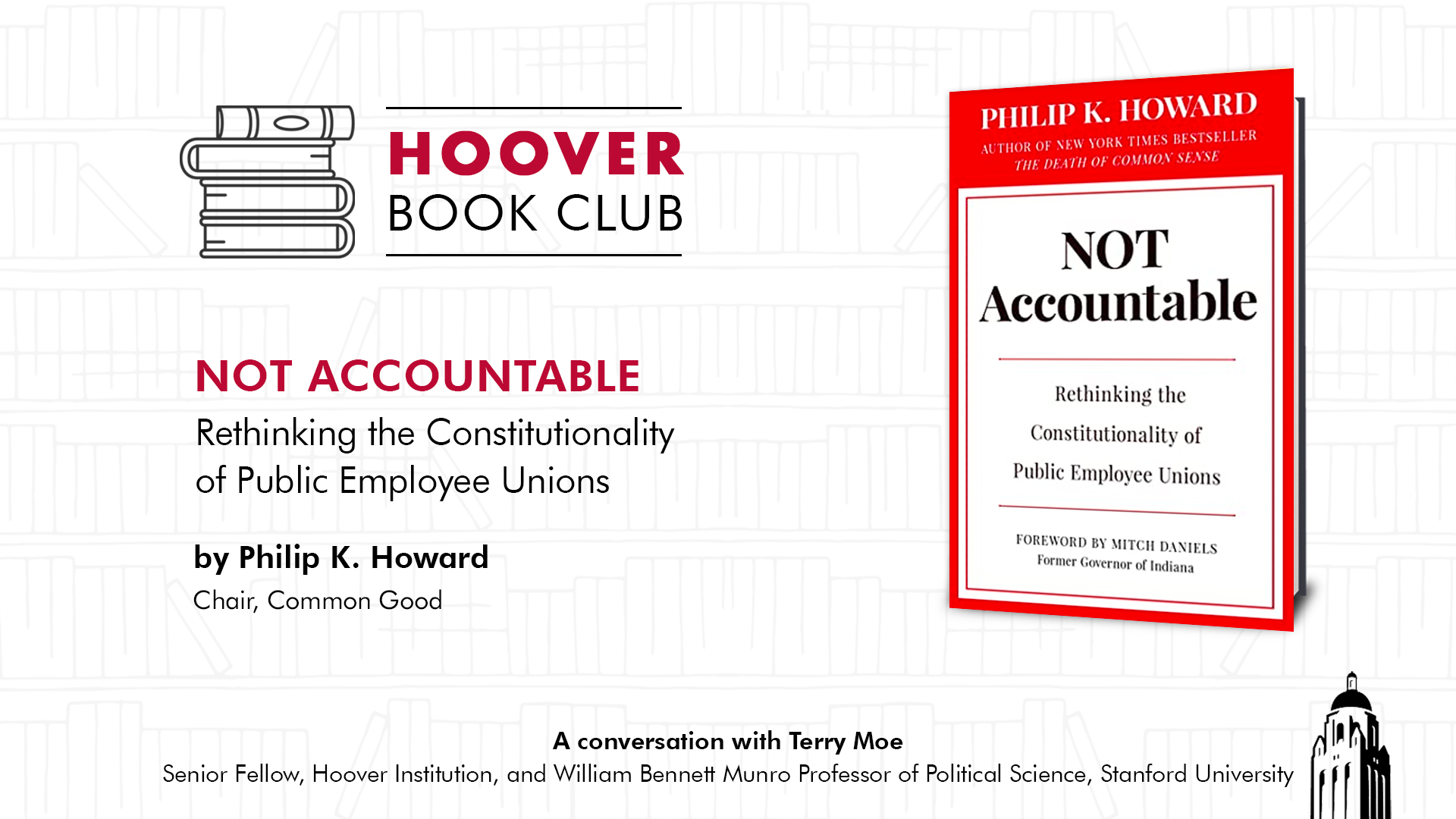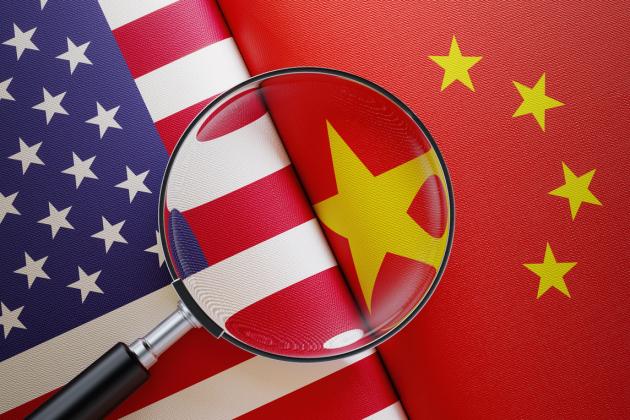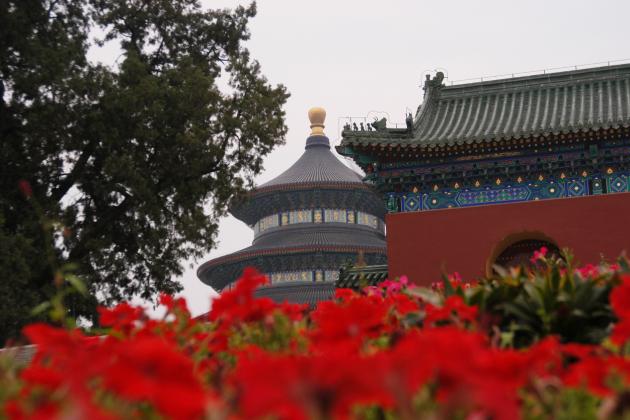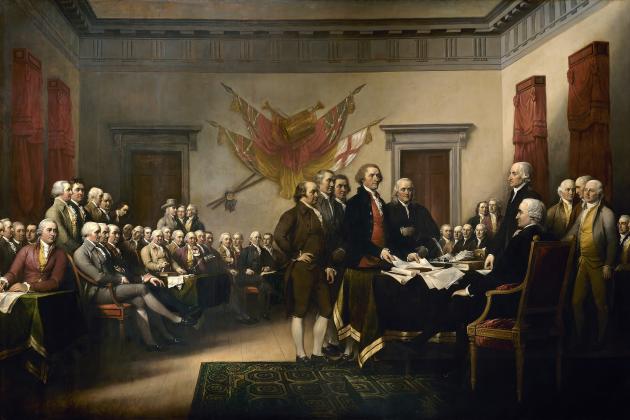Join the Hoover Book Club for engaging discussions with leading authors on the hottest policy issues of the day. Hoover scholars explore the latest books that delve into some of the most vexing policy issues facing the United States and the world. Find out what makes these authors tick and how they think we should approach our most difficult challenges.
In our latest installment, watch a discussion between Terry Moe, a senior fellow at the Hoover Institution and the William Bennett Munro Professor of political science at Stanford University, and Philip K. Howard, author of Not Accountable: Rethinking the Constitutionality of Public Employee Unions on Tuesday, March 28, 2023 at 10:00 am PT/ 1:00pm ET.
WATCH HERE
>> Terry Moe: Hello, thank you all for joining us. I'm Terry Moe, a senior fellow at the Hoover Institution and a professor of political science at Stanford. Welcome to our latest installment of the Hoover Book Club, where we bring Hoover fellows and friends together to discuss their latest writings. Today, we're very fortunate to be joined by best selling author, Philip K Howard.
Philip is the chair of Common Good, which he founded in 2002 as a nonpartisan coalition dedicated to simplifying government and its laws to reflect common sense approaches to our nation's problems. Imagine that. Over the years, he's written a number of provocative books on governmental reform. His latest book is titled Not Accountable: Rethinking the Constitutionality of Public Employee Unions.
And that's what we're gonna be talking about today. So welcome, Philip. Great to have you with us today.
>> Philip K. Howard: And great to be with you, Terry.
>> Terry Moe: Look, maybe I should just start out by asking you to summarize for all of us the main themes of your book.
>> Philip K. Howard: Well, the book basically looks at public employee unions through a different lens than they've been looked at before, which is through the lens of constitutional governance. And what's happened almost without people noticing when or how, the public unions seize control of the operating machinery so that voters elect mayors and governors who don't actually have the authority to manage the school system or fire a rogue cop.
And so democracy doesn't work very well if the people elected who promised to fix things don't have the authority to do so. And so I develop the arguments and then give constitutional reasons why that shouldn't be allowed.
>> Terry Moe: Okay, well, so what's the difference in your mind between public sector unions and private sector unions?
Do you have the same kinds of objections to private sector sector unions?
>> Philip K. Howard: No, not at all. Private sector unions first have a completely different origin story. They were created during the Progressive Era when employers were mangling workers in factories and coal mines and such, and the unions were essential to safety as well as basic fairness.
And I think there's still an important role for public unions in, I mean, private unions, trade unions in certain industries. Public union, the origin of the story is completely different. Unions existed, but they had no collective bargaining authority until the 1960s, and there was no reason for it.
Most public workers already had civil service protections and the like. There was no scandal that authorized. It's just that the union leaders wanted more power. So again, almost without people noticing it, they got collective bargaining rights by pliable political leaders back mainly in the late 60s, although it started a little before then.
And quickly, it became apparent that both the bargaining dynamic and the implications of it were completely different than trade union. So just to give three reasons. First of all, what they're bargaining for is different. In a trade union context, it's really about bargaining, dividing the share of profits between capital and labor.
So there's actually kind of a limited amount that people can bargain for in today's terms. That's not true with public sector unions. There's no profit in government, obviously. So whatever the public unions can get away with, the taxpayer has to pay for it. The second difference is that the management in the public sector, the mayor or the governor, doesn't have leverage.
He can't move out of town, he can't go out of business. In the trade union context, if they ask for too much inefficiencies, then everybody loses their jobs. There's no risk of losing your job in the public bargaining sector. So again, there's a dramatic leverage difference. But the third reason and the most important difference, I think, is that in trade union bargaining, it would be unlawful for management to collude with any sort of workers to create some kind of sweetheart deal.
That's actually explicitly barred in the National Labor Relations Act. Public bargaining is basically nothing but collusion. The public unions have amassed enormous political power. They use it to get friendly political leaders elected. I mean, we're talking about millions of dollars in governor's races and busloads and workers manning the phone banks and the campaign headquarters and such.
And then when they get into office, they don't sit on the other side of the bargaining table. They sit on the same side of the bargaining table and tell them what they want. It's not so much a negotiation as it is a payoff. So it's just completely different, the difference between trade unions and public unions.
>> Terry Moe: Okay, so let's go back. The private sector unions got organized first, and it took a while, decades, for public sector unions to get organized. Why is that?
>> Philip K. Howard: Well, public sector unions actually wanted to organize earlier because, and Daniel DiSalvo goes through this in his history of the public sector unions, Government Against Itself, which is quite a good book, following up your quite good book, Special Interest.
And basically, when we got rid of the spoils system in the late 19th century, the idea of public sector workers negotiating and organizing became sort of practical because, all of a sudden, they didn't lose their jobs every election cycle. There was a natural interest group of, of permanent public employees.
And so they started organizing really before 1900. Teddy Roosevelt had to fend them off at one point. And so throughout the Progressive Era and up into the New Deal, the public sector workers kept pushing political leaders for more power. And the political leaders basically said no. And Franklin Roosevelt, who was a big supporter of organized labor, could not hardly have been clearer.
He said at one point, the process of collective bargaining cannot be transplanted into the public service. And the reason is because the idea of public workers negotiating against the public good, putting themselves first in line for public dollars and such, was considered a breach of loyalty. I think early on, I'm trying to think of his name, the labor leader in the 19th century refused to let.
Police join the trade union, because he said it would be a conflict of interest because they had a duty to serve the public, not to negotiate against the public.
>> Terry Moe: So when did they get organized?
>> Philip K. Howard: Well, as I said, they were organized, but they didn't get collective bargaining rights until there was one or two instances in the late 1950s, I think, Wisconsin and the city of New York that allowed certain collective bargaining rights.
And then the big break came in 1962 with JFK's executive order, ten 988, where he allowed federal employees to collectively bargain for everything except wages. And that executive order is interesting, preceded by a special committee report that was chaired by Arthur Goldberg. I don't know if you've ever read it before, but it's just incredibly vacuous.
I mean, it's a special committee report that says, well, we should let them collectively bargain. Because it will help make government more efficient, or something, with all these conclusory statements with no evidence of any problem whatsoever. And Jim Landis, the famous New Dealer, had given a report to JFK in the late 50s as part of his election campaign stuff about the problems in the federal service.
And the problem was not abuse. The problem was not anything except basically sleepiness, that the administrative state had evolved following the passage of the Administrative Procedure Act in the late 1940s. It evolved in a way that people just did process and they didn't make decisions. And Landis said, where is all the decision making that we had in the New Deal and such, these purposeful public leaders that people wanted?
So the problem wasn't one that would be helped by collective bargaining by the unions, it would be helped by strong leadership. Instead, we got the opposite.
>> Terry Moe: Right, well, there was the problem of effective government, of course, and how civil service and unions were gonna affect that. But at the time, in the early 1960s, that still there were almost no employees in public sector unions.
>> Philip K. Howard: Okay.
>> Terry Moe: And it was during the 60s and 70s and into the 80s that they really got organized, right?
>> Philip K. Howard: Right, and so the next thing that happened was in 1967, collective bargaining was authorized in the state of New York, it was something called the Taylor Law.
And that was preceded by really quite a thoughtful report by someone named George Taylor, who was a labor law professor at the University of Pennsylvania, about how it should work. And remember, this was the end of the 1960s. So we're talking about the rights revolution and the public sector union leaders.
They kept saying, what about our rights, why can't we have the same rights as trade unions? Again, people had forgotten or weren't aware of the differences, and the pressures kept building politically. And they had already organized into a pretty potent voting bloc, so there was a reason for political leaders to want to give public employees what they wanted.
So the Taylor report basically said, well, it might be okay. And they said it's basically fundamental fairness that other people have bargaining rights, or why shouldn't public sector unions have bargaining rights? But then it had all these qualifiers, and it said, but the one thing that has to be clear is the final decisions have to be made by politically accountable officials.
So for example, the Taylor Report said you couldn't do this lawfully unless the legislature retained the power to approve collective bargaining agreements cuz someone accountable to voters had to make the final decision. Well, needless to say, the New York State Legislature ignored that. And they didn't have the final collective bargaining agreements accountable to voters.
And within a year or two, they, even worse, changed the law in a way that Professor Taylor said would clearly be unlawful. Which was to have any dispute over collective bargaining be decided by arbitrators, and arbitrators, in fact, approved by the unions, which is the way the law works in New York still.
>> Terry Moe: Well, this spread all around the country.
>> Philip K. Howard: That's right, I think within two or three years, 20 states had collective bargaining. And at this point, it's 38 states out of the 50 have collective bargaining rights. They vary somewhat from, from state to state. There were also a number of reports back in the late sixties and early seventies, like the city of Los Angeles had its own special committee doing a report on how it should work.
And these reports were all very cautionary. They said, well, we can do it, but we can't take away the management authority of the people running, who are elected to run the government. We can do it, but we have to have final decisions be made by people who are accountable to voters and such.
None of which is the case at this point. I mean, the decisions, as I detail in the book, the decisions about these collective bargaining agreements in most states are almost completely divorced from accountability to voters.
>> Terry Moe: Yeah, so there's sort of a catch-22 in the accountability equation, right?
Because you can say that legislators and other elected officials need to be making the final decisions, but then what forces are they responding to?
>> Philip K. Howard: Right, and-.
>> Terry Moe: And are they responding to ordinary voters or are they responding to the power of the unions?
>> Philip K. Howard: Well, first of all, yeah, I mean, there's the political point, they're responding to the power of the union.
But in the state of New York, for example, they literally don't have the authority by law to make decisions. So you get elected as a mayor, you come into office. The collective bargaining agreements are not coterminous with election cycles. So the elected official is bound by the terms of these agreements, which are often several hundred pages long and mean there's no accountability when there's no effective manageability, very rigid work rules and such.
So that official is bound by law to that agreement. Then at some point, the collective bargaining agreement ends. They're typically about five years long. And then, theoretically, leaving aside the politics of the situation, the elected leader could sit down and negotiate a new agreement. But in New York state, if the union doesn't like it, they just say no.
And the disagreement goes to an arbitrator. So it doesn't go to anyone who's elected. No one elected the arbitrators. And then if for some reason there's still a stalemate going on in New York State, there's a law that says that the terms of the existing collective bargaining agreement will continue indefinitely, together with all cost of living increases built into it, until there's a new agreement.
So literally, there's no link to the voters between an elected official, even one who wants to change the collective bargaining agreement, and how a new collective bargaining agreement works. It's outside the power of the democratic electoral process.
>> Terry Moe: Yeah, well, it seems like the real problem here, to the extent it exists, is that public officials are responsive to power, and ordinary voters often don't have as much power as organized interest groups do.
And on matters of public sector wages and benefits and these kinds of things, public sector unions have a lot of power. And officials that they're bargaining with are responding to that rather than to what's best for the voters. And that's where the accountability problem comes in, I take it.
>> Philip K. Howard: Yeah, yes, so I would say that there are two problems. There's a legal power point which distinguishes this from other interest groups which give money to politicians. Other interest groups, the National Rifle Association or whoever they are, they don't have the right to collect bargaining. An elected official doesn't have to sit down with them and make a deal as a matter of law, and they don't have legal rights that are reflected in these collective bargaining agreements.
So you start with a sort of illegal. It's not even a thumb on the scale. It's like a brick on the scale. And then you add to that the reason politicians found themselves in this predicament, which is all the political power of the unions, which you detail, and which I quote over and over again in my book in special interest.
Which is just, I mean, at one point, I think you found that in a number of states, the teachers union gave more money than all business groups combined in the election cycle. It's just extraordinary. And another difference between the political influence of the public employees' unions and trade unions is that, I'm sorry, and all other interest groups, the Chamber of Commerce, all other interest groups, is that most interest groups are looking for a sliver.
Give us a subsidy, give us a right, give us some amount of money, a billion dollar subsidy here or there or whatever it is. And however big it is, it's a tiny fraction of what government does. What the public employee unions are bargaining for is control over the entire operating machinery of government.
We're talking about just orders of magnitude larger than any other interest group is fighting for. A tax break might be worth billions of dollars. The employees of government at all levels in this country consume $2 trillion of the annual budget. It's like 20% of the total government spending is employees.
And that doesn't count the impact of how government works. I mean, the failure of schools, for example, that can't get fixed. So we're talking about a problem that, I think people. I keep thinking of Upton Sinclair's The Jungle, when he walks into a factory, and this factory is just horrible.
They're mangling the workers. The conditions are incredibly unsanitary. People are disgusted by the fact that they're eating this stuff in these conditions. When you walk into how government works, the unions, these agreements have no, or virtually no redeeming qualities. They're designed, the work rules are designed for inefficiency.
The lack of accountability doesn't attract good workers to government. It repels good workers from government. There are all these stories that show that because you get a horrible culture when everybody knows that performance doesn't matter. So you have this control over government. That, to me, is like the jungle.
The trash collection in New York City costs, municipal trash collection costs twice what private carters is true. That's true in Chicago too. The MTA had to sanitize the subway cars during COVID, and they didn't have enough workers, so they hired companies to help out. The companies did three times as much work as the MTA workers did because they were manageable.
So you have this system of government that's really designed under union controls. It's really designed for failure. It's a scandal.
>> Terry Moe: So if you get down to it and try to think about what motivates them, right, if you try to explain their behavior, right, what is it that you think is at the core of their motivation?
When they're engaged both in politics and in collective bargaining, what are they trying to get?
>> Philip K. Howard: Power, they're in control. There's only so much you can bargain for in a collective bargaining agreement. And you've written about this, the reason the benefits they get are stretched out into the future or are opaque is so that taxpayers can't understand it, right?
They'll have overtime rules that allow pensions to be spiked with lots of overtime in the last year. They'll have all kinds of other benefits that you could never kind of go in and figure out, well, what's the point of a rule that says the principal can't come in and look and observe the teacher?
Or what's the point of the rule that says you've gotta get union approval to deploy any resources? So if someone's sick, you've gotta negotiate with the union rep how to cover some classroom, or whatever it happens to be. In the federal government, you're moving people around to a new office.
You have to negotiate over who gets to sit at what desk. I mean, what's the point of these rules? I mean, it's almost like a pathological. Personal relationship where people are seeking control for its own sake. So they sit down at the bargaining table every five years and they negotiate all these controls that basically give them a veto over how government works.
If it doesn't work exactly in the kind of central planning way that the collective bargaining agreement lays out, which circumstances change, you've got to be flexible. So you have this crazy situation where, where it's like you've unplugged the spokes from the hub and you expect the government agency to move forward, and it can't until it negotiates how to move.
Every day with the union rep. It's just power. I mean, one of the things we're going to do, maybe you'd like to get involved in it, is host a series of forums on what a better deal for teachers would be. How do you make an employment system? I think you could pay teachers more.
You do all kinds of things that would be a lot cheaper than what we have now, which is an unmanageable school system across the school systems across the country and unmanageable municipal agencies and such. It's just not a good system. It's just union leaders. I mean, look at them.
You might as well be watching a governor or president or something. They sit down and talk about how things are going to use. Schools are not going to open during COVID because we've decided that teachers shouldn't have to bear this risk. Well, what about all the nurses and nurses aides and the grocery clerks and everybody else who's keeping society running?
Why don't teachers have to do their jobs?
>> Terry Moe: Yeah, I think another twist on what you're saying is that instead of thinking of good guys and bad guys in this, you can just think that, okay, teachers unions are representing teachers, and teachers want certain things. And above all else, they want security, job security, and they want higher wages and they want better benefits and they want better working conditions, and that all sounds very straight ahead.
Who could argue with that? But what it comes down to are things like, okay, we don't want the principal coming into our room unannounced, to observe our behavior. And we wanna have seniority so that we're protected, so that if there are layoffs, the people with the least seniority get laid off.
Well, what if they're the best teachers in the school?
>> Philip K. Howard: Right.
>> Terry Moe: Right? Okay, but still, teachers will support seniority. And you go right down the line. And it's not because they're bad people, it's because they're just trying to protect themselves and have a good living, but their interests are not the same as the interests of children and the interests of effective education.
And that that is the conflict. And it's not because anybody's good or bad. It's just because there's a conflict of interest. And if they have a lot of power, their interests are gonna win out and the kids are going to get short shrift and the schools are gonna be organized in ways that are ineffective for them.
>> Philip K. Howard: Well, yes, thank you for that. That's clearly accurate. But it's also, it's a little bit like Plato's cave, right? I mean, people, there's a natural human instinct for security. So if you give people food, they'll sit in the cave and they'll sit there all day and all night until they finally die, because people don't wanna go out and face the wild and the saber toothed tigers or whatever it was out there.
So there's a natural instinct for people to want security. And teachers are no different than anyone. So they, so they subscribe to the unions. They get their security. And of course, just as in Plato's cave, it's really, in fact, not good for them because they end up. The thing about, for example, no accountability is not that you have lots of bad teachers, although that you have some and those some make a big difference.
Is that when everyone knows performance doesn't matter, it's like letting the air out of the balloon of a culture. It's like organizational psychology 101. It's like putting a depressant in the air. Why should I go the extra mile if nobody else is going the extra mile? And then the thing that you want, which is a public service to a school with pride and energy and stuff because you're doing such a good job, is not even possible.
So, yes, everybody wants security, and so they cling to it. But the cost of the security is not simply that the kids are hurt, which you point out, which they are. The cost of the security, ironically, is that the teachers are hurt because they're living, they're working in an environment that's listless and dreary and without pride.
And Paul Volcker did these reports from the federal civil service. They do reports, and he talked about this. It's really important to have accountability so that people feel that they're part of public service that's really helping everybody. It's a culture of energy. So I think you're right that people want it because it's the human instinct and want safety and security.
But ultimately, I think the only people who win here are not so much the teachers, maybe the bad teachers. The people who win are the union leaders.
>> Terry Moe: Maybe you can talk a little bit about how this differs between levels of government. So how are public sector unions influential at the federal level compared to the state and local level?
>> Philip K. Howard: Right, okay. Good, I mean, it's a good question. About 25% of federal employees belong to public unions, and they're typically in a few agencies, the national treasury, workers unions, some others. I mean, it's divided up by agencies and they're not allowed to negotiate over wages. So it's mainly work rules.
And there is no accountability in the federal government. As with everybody else, 99% of all federal employees get a fully successful rating because if you put anything negative in the file as a supervisor, you have to go to a hearing to justify it. So it's always, who has time to do that?
Who has time to say somebody doesn't try hard or doesn't cooperate or whatever the. So one of the big supporters of the, of the work I've been doing is the senior executive service association. So the highest level federal bureaucrats who supervise workers really want their supervisors. Supervisory powers back.
They wanna be able to run their agencies so that they are high performing agencies, which is very hard to do under the civil service protection. The state level government, it's about 30% of state level employees are unionized. Again, that's in 38 states. A local government's about 40%. So overall, it's about 33% of all government employees.
I would say that the controls are probably worst on the state level because it's further away from the ground. And in big cities, in small cities, the culture tends to trump the bureaucracy because people know each other, right? I mean, people are trying to get the job done or run the school, whatever it happens to be.
Big cities are much more anonymous and it's just a nightmare in Chicago, New York, La. So I think there are differences and also differences by jurisdiction and the places, the few places where it was unionized, and they've gotten rid of unions like Wisconsin, Scott Walker. The indicators are that it works better.
So not crazy, it's just better. People go to work, they think they have to do their job. It's just a healthier public culture.
>> Terry Moe: At the state and local level, one thing that happens is that the unions, public sector unions, which would be the teachers unions and AFSCME and SEIU and police and fire, are big fish and small ponds, right?
Compared to the national level, right? At the national level, there's much more competition among interest groups. There are many more interest groups, but in many states that's not true. And at the local level it's not true. And so I wonder if you could reflect on that and also talk about like just police and fire unions.
I mean, people tend to look at them, they're really representing the public and their public safety representatives. And they are, they do good things for the public and they're absolutely necessary, but they're also very powerful interest groups at the local level.
>> Philip K. Howard: Right, I think politically, at the local level, as you point out, there are some states where, where the public unions really more or less own the political system.
I mean, they literally, in New Jersey, staff the campaign headquarters for the new governor. They got all the signatures to get him on the ballot. They've thousands of people knocking on doors, tens of millions of, tens of millions of dollars in contributions. I mean, it just swamps, it really swamps every other interest group.
And so you can't possibly cross them. I had a friend who runs a democratic think tank read my book not accountable, and called me up after a while and said, listen, I've been thinking about this, and there's nothing in here I disagree with. I think this is really a serious problem for democracy and problem.
But of course, I can't say anything without self-immolating. I know a lot of political leaders who are democrats, and they would like nothing better than to be liberated from union controls, but the unions are just so powerful that it's not realistic. Just to give you an example, I mean, police, I think, are different than teachers because police have a uniquely difficult to be out on the streets, particularly in dangerous neighborhoods where your life is on the line, is very hard.
And I think the police, a lot of liberal reforms have not been fair to the police. A lot of the things you must prove, you had probable cause. When their instincts tell them, they know that this person's up to no good or whatever. But the unions have succeeded in really creating toxic police cultures by making it so that police don't interfere with other police misbehave.
So in Minneapolis, which is where George, George Floyd was killed by Derek Chauvin, the policeman, there were three or four cops who sit there watching him, young cops with his neck on the knee. One of them said something at one point and then was shut up by everybody, didn't do anything.
So you don't have that kind of interaction you would have in a healthy organization where you stop people from misbehaving. And in the prior decade, there'd been something like, I think, 16,000 complaints to the Minneapolis Police Department for inappropriate behavior, you know, excess force, etcetera, of which twelve resulted in discipline.
And the most harsh discipline was a 40 hours suspension. So that's a system where you can do whatever you want and you can get away with it, basically. So no accountability does distort the culture in ways that it's just bad for everybody, it's bad for the cops. And I really think we need a new deal for all these things, all these really important public positions.
People need to be paid fairly, but they need to be manageable, and they need to have a culture that's directed towards the public good, not a culture that's directed toward their own good. And that's fundamentally what the unions have done over the last 50 years have created this culture that's just insulated from good management and insulated from democratic accountability.
>> Terry Moe: Maybe you could talk a little bit about how, say, the police and fire unions, also the teachers unions actually gain power at the local level, let's say, right? I mean, you have elected officials, mayors, school board members, city council members, and they're making important decisions about the police and about fire departments and about school districts.
So how is it that the unions exercise influence?
>> Philip K. Howard: Right, I think the police and fire unions exercise influence in different ways than the teachers unions. So there's 7 million members of public employee unions in the country, of which four and a half, give or two. Take are teachers, so the teachers exercise influence not with moral authority, but with unbelievable money and brute force.
I mean, they are I tell stories in the book, and you tell stories in special interest. Your book, the brute force is really amazing, I mean, we're talking about like the Teamsters or something. They're very thuggish behavior, the police exercise are much smaller. We're talking about half a million members of police unions, something like that.
But the police are very influential with voters, so police endorsement voters care about safety, rightly so. And so police endorsement means a lot. And so the,
>> Philip K. Howard: So public elected officials want to get the police endorsement, and they'll do what they want. It's interesting the police management controls are not nearly as bad as the teachers or ASME or the other controls.
The police controls are mainly about a lack of accountability, it's not about manageability as much.
>> Terry Moe: So do police unions participate in elections? Do they spend money in elections, support candidates in elections? And how about firefighters?
>> Philip K. Howard: I don't have the numbers on that, actually, cuz I've focused mainly on the teachers and the bureaucratic unions.
But yes, I think, for example, the recent Merrill election in Chicago, Valli's, who is the kind of reformer, got the support of the police and got, I think, money and other support from the police. And the person who finished second, there's gonna be a runoff. Person who finished second got, I think, 90% of his campaign funding came from the teachers unions and a couple of other public unions.
Literally every every millions of dollars all of it came from the union.
>> Terry Moe: Yeah. And one interesting sideline about the firefighters is that typically at the local level, they have a lot of time off. Because they have a lot of time on where they're working in the firehouse for 24 hours straight or for 48 hours straight, but then they have time off.
And so in many communities, that gives them a lot of time to campaign and to go around and firefighters support so and so. And shockingly, they become a fearful presence in politics in many communities.
>> Philip K. Howard: Interesting, I didn't realize that. But that makes sense, I mean, I think people, it's very hard to monetize the kind of hours spent by union members.
But if you're a legislator, say, in Albany, New York, and you're holding a hearing, and all of a sudden 60 people walk in with placards saying down with so and so or whatever. Guess what? They were all paid for by the teachers union to go up there and spend the time, and they provided the buses and all that to do that.
Citizens don't have the time to take the day to go up to Albany, but maybe the firefighters or the teachers or others do. And so all of a sudden, democracy at work is actually off duty. Public employees often given an honorarium to do this, showing up in the halls of the legislature to protest anything they don't like.
And I think the relentlessness of the public unions is something that people don't appreciate. Last year, or maybe now, it's a year before, the public unions introduced 21 bills in the New York state legislature to sweeten pensions, 21 bills. Now, not all of them passed, but some of them passed, so that gives you a sense, you have this kind of relentless, huge presence.
And so when I say this in my book, not accountable. But it's as if what's happened is that the public unions have harnessed the mass of good government against the reform of good government. Government's gotten so big, it's half the G half, the economy of the country, and you get some significant share of the public workers.
There are 22 million public workers in this country. You get some significant share of them actively organized basically to prevent reform. So-
>> Terry Moe: Let me just quickly ask you, we don't have a lot of time left, but I think this is an interesting issue. One theme that I think you're making in your book is that these workers are protected by civil service anyway.
And that there's a civil service system that provides a lot of the things that they seek. But also what you want in the end is more executive control of the administration. And I assume you mean not just control of, say, union members. And you think that membership should be unconstitutional, but also more control of civil servants.
So is that the case? Do you think executives should control?
>> Philip K. Howard: Sure, and so, and the problem that I identify is not just in collective bargaining agreements. The laws have been passed over the last 50 years at the behest of the unions, largely to put all kinds of control.
The Civil Service Reform Act of 1978, federal law, contains very detailed provisions about discipline of federal employees, which makes it impossible to discipline federal employees. I mean, the proof is in the pudding, it's impossible. And so I argue that's unconstitutional under Article 2. Article 2 there's a raft of cases under Article 2 about what executive power means.
Congress doesn't have the authority to take away effective executive power, executive power belongs to the president, not to Congress. And my constitutional arguments on state and local government are on the same principle. But it relates to another provision of the Constitution, just called the guarantee clause in Article 4.
Which says the United States shall guarantee to every state a republican form of government. And what James Madison said, that meant with whatever form of democracy a state adopts, the people elected have to retain their power to run government. They can't sell it, they can't give it to a group of aristocrats or, to quote, any favored class.
And what's happened over the last 50 years, again, almost without our knowing it, the state legislatures have given, The public employee unions, the power of collective bargaining, and all these other controls that mean that the people we elect as governors and mayors no longer have the authority to manage.
It's not just authority over employees, it's to make basic resource allocation decisions about how you do the trash collection. Or how you organize the workforce in the subway system, or how do you fix a lousy school? There are all kinds of decisions that making anything work, as anybody who's ever done anything knows, is not a formula.
It's a question of adaptation. All the time, we've taken that away from the people who run government, and I think that clearly violates the principles of those constitutional provisions.
>> Terry Moe: So near the end of the Trump administration, Donald Trump tried to push ahead with what was called schedule f, civil service reform, where he wanted to be able to fire at will any public employee, civil service employees that had any kind of policymaking responsibility.
And that, to many people, smacked of a new spoil system, which leads to all the problems that we're very familiar with. So if you do go for more executive control, how do you avoid those kinds of problems?
>> Philip K. Howard: Well, the schedule f, which I didn't think was a good idea, but I do think the president had the power to do that.
And his schedule f was based on a paper I had written saying what the power of the president was. And I disagreed with Schedule F. So I told him that. But I think what you want is an employment system that's trustworthy, that attracts good people, and that the public can trust.
So I think you need speed bumps to protect against, for example, political firing, partisan firing. And it's not that hard to create that. And there are lots of examples in history where we've done that in this country. So I wasn't for schedule f, but the irony of people talking about how terrible it is that it could be a new spoil system, which it sort of would be like, is that public unions are the new spoil system.
Remember, the spoil system was all about giving political hacks jobs because they supported a candidate, and they kept the job just because they supported the candidate, no matter how inept they were. And we got rid of it by creating Civil Service, which was supposed to be a merit system.
People would get and keep their jobs based on merit. And Civil Service was not a system of tenure. It was a system, as one or the reformers said, if the front door is properly tended, the back door will take care of itself. It was a system of neutral hiring.
We don't hire people based on political influence. We hire them based on their competence, and then they'll keep their jobs if they do a good job. And that was supposed to be in the authority of the people. Well, guess what? Fast forward 170 years, we have a system where people keep their jobs, no matter how inept they are.
Literally, 0.01, 0.02% accountability for performance. I mean, virtually nobody, 2 out of 95,000 teachers, I think, was the number you came up with in Illinois over an 18 year period, lost their jobs for performance. So we have a new spoil system. And so I disagreed with what Trump did, but how can people tolerate that was for only 2000 senior civil servants.
How do we tolerate it for the other 22 million where it doesn't matter what they do, it's just they keep their jobs no matter what. That's a problem that I think needs to get re-examined in our society. I mean, think of all the things that we could do with resources freed up from inefficiency.
Think of all the lives that would be enhanced, indeed saved, if we could really transform the schools, inner city schools, where not one student is proficient in reading or math. You know, think of all the good people who would go into government if it was a career of energy and pride, you know, where people had authority to do their jobs.
The only reason they have authority is because they're accountable if they don't exercise it well. Think of all the things that could happen if we actually could make government work again.
>> Terry Moe: Okay, well, we're just about out of time, but I want to leave you with one final question that you can answer briefly, but that goes to the heart of your book.
You think that public sector union should be declared unconstitutional. How would that happen? What would it look like?
>> Philip K. Howard: It would be, we're already working on one case in Illinois with a public interest law firm. The unions would not per se be unconstitutional. The controls they exercise over the operating machinery would be unconstitutional.
Collective bargaining agreements, other controls that have been put in by the legislators. I also have an argument that they shouldn't be able to allow to organize politically against the public interest, that public employee can have whatever political interest they want to individually, but shouldn't be able to mobilize with a million others to hurt the public.
So we're talking to groups in different states, and hopefully in California as well, on bringing lawsuits which would eventually make their way up to the Supreme Court. And the Supreme Court would have to make some new law here, as I discuss in the book. But it's not a giant step.
It's a step, but it's not a giant step. And I think the goal here is fundamentally good government and functioning democracy.
>> Terry Moe: Okay, well, I guess we'll have to end it there. Thanks a lot, Philip. This has been a really provocative and lively conversation, as I expected it would be on a really important topic.
And I also want to thank everyone in the audience for joining us today. So you can find Philip's book for purchase online. Again, its title is not rethinking the constitutionality of public employee unions, so thank you for listening, and I hope you have a great day.
ABOUT THE AUTHOR
Philip K. Howard. Philip is a leader of government and legal reform in America. He is Chair of Common Good. In 2002, Philip formed Common Good, a nonpartisan coalition dedicated to simplifying laws so that Americans can use common sense in daily choices. His 2010 TED Talk has been viewed by more than 750,000 people. His 2015 report, “Two Years, Not Ten Years,” exposed the economic and environmental costs of delayed infrastructure approvals, and its proposals have since been incorporated into federal law.
ABOUT THE BOOK
“Elected leaders come and go, but public unions just say no.” Hiding in plain sight is a fatal defect of modern democracy. Public employee unions have a death grip on the operating machinery of government. Schools can’t work, bad cops can’t be fired, and politicians sell their souls for union support.
With this searing five-point indictment, Philip K. Howard argues that union controls have disempowered elected executives and should be unconstitutional.
Union power in government happened almost by accident in the 1960s, ostensibly to give public unions the same bargaining rights as trade unions. But government bargaining is not about dividing profits, but making political choices about public priorities. Moreover, the political nature of decision-making allowed unions to provide campaign support to friendly officials. Public bargaining became collusive. The unions brag about it: “We elect our own bosses.”
Sitting on both sides of the bargaining table has allowed public unions to turn the democratic hierarchy upside down. Elected officials answer to public employees. Basic tools of good government have been eliminated. There’s no accountability, detailed union entitlements make government largely unmanageable and unaffordable, and public policies are driven by what is good for public employees, not what is good for the public. Public unions keep it that way by brute political force—harnessing the huge cohort of public employees into a political force dedicated to preventing the reform of government.
The solution, Howard argues, is not political but constitutional. America’s republican form of government requires an executive branch that is empowered to implement public policies, not one shackled to union controls. Public employees have a fiduciary duty to serve the public and should not be allowed to organize politically to harm the public.
This short book could unlock a door to fixing a broken democracy.







